A Cold Alaska City Has Become a Heat Pump Hub
The ‘electrify everything’ movement is taking off in Juneau, Alaska.
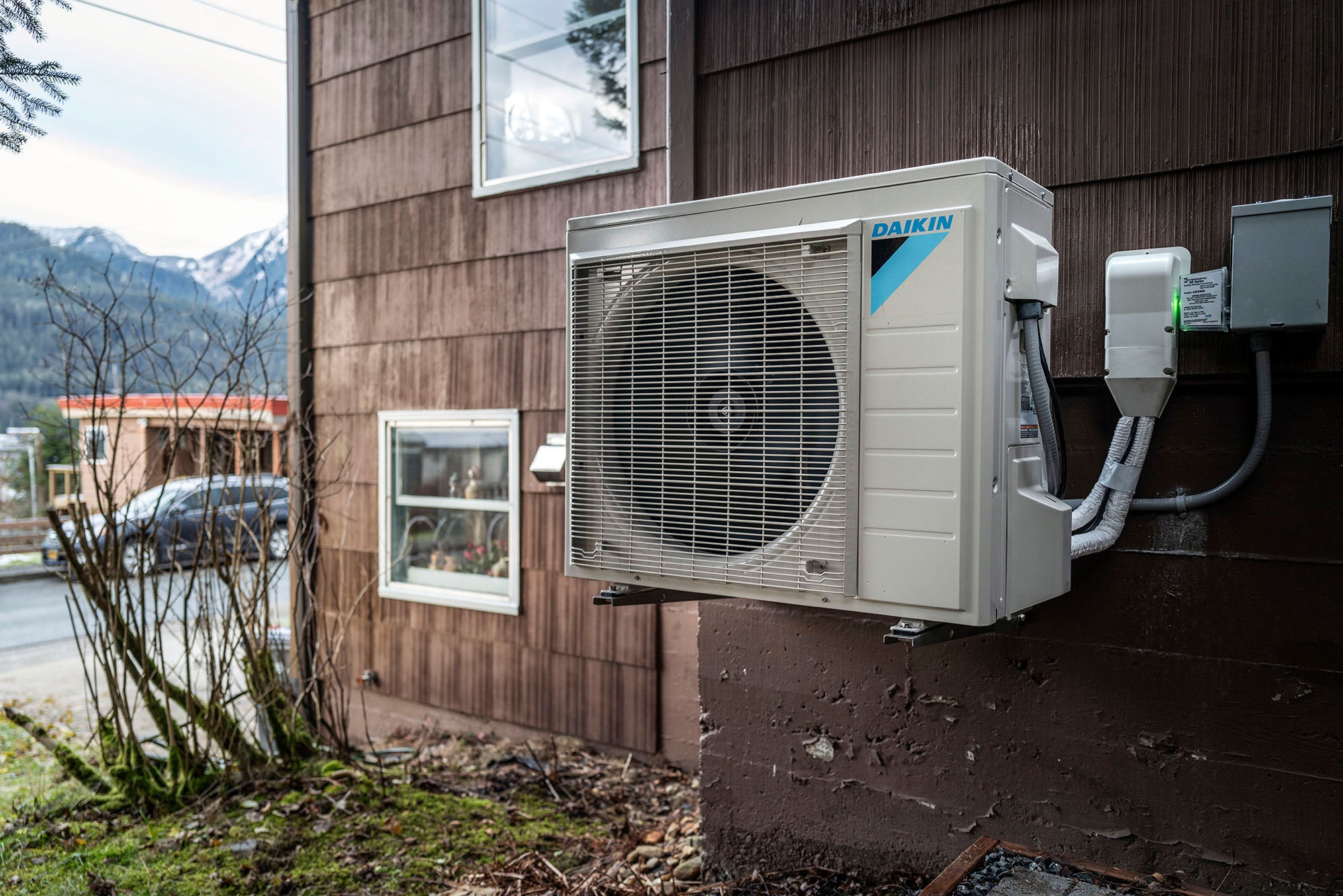
This page was published 2 years ago. Find the latest on Earthjustice’s work.
Here’s a fact that might surprise you: In Juneau, Alaska, population 31,000, roughly one in seven homes is heated by a heat pump.
Homeowners considering getting a heat pump sometimes worry whether they work well in colder climates, but you can put that anxiety to rest. Despite winter temperatures that average 29 degrees Fahrenheit and an annual snowfall of more than six feet, heat pumps have been selling like hotcakes in Alaska’s capital city — so much so that heat pump installers are struggling to keep up with the high demand.
Heat pumps have surged in popularity in Juneau for a range of reasons from increased heating fuel costs to supportive city leaders, firm clean energy targets, and local efforts by Alaska Heat Smart (AHS), a Juneau-based nonprofit that is helping consumers integrate heat pumps into their homes.
To Andy Romanoff, executive director of Alaska Heat Smart, it’s no surprise at all. The fact that building electrification is spreading even in Alaska, a politically conservative state, faster than bears pack on pre-winter pounds speaks volumes to the movement’s sound economic sense.
“Most of the heating oil burned in Juneau and other regions of Alaska has to be piped and barged for hundreds or thousands of miles, burning fuel along the way before it finally lands as heat in someone’s home,” Romanoff says. “That’s a bit nutty when you really think about it. Heat pumps, on the other hand, move heat from outdoor air into the home, and do so at a fraction of the cost of fossil fuel heating. The choice is a no-brainer.”
“The real question we should be asking,” he adds, “is ‘Why are we still burning oil?’”
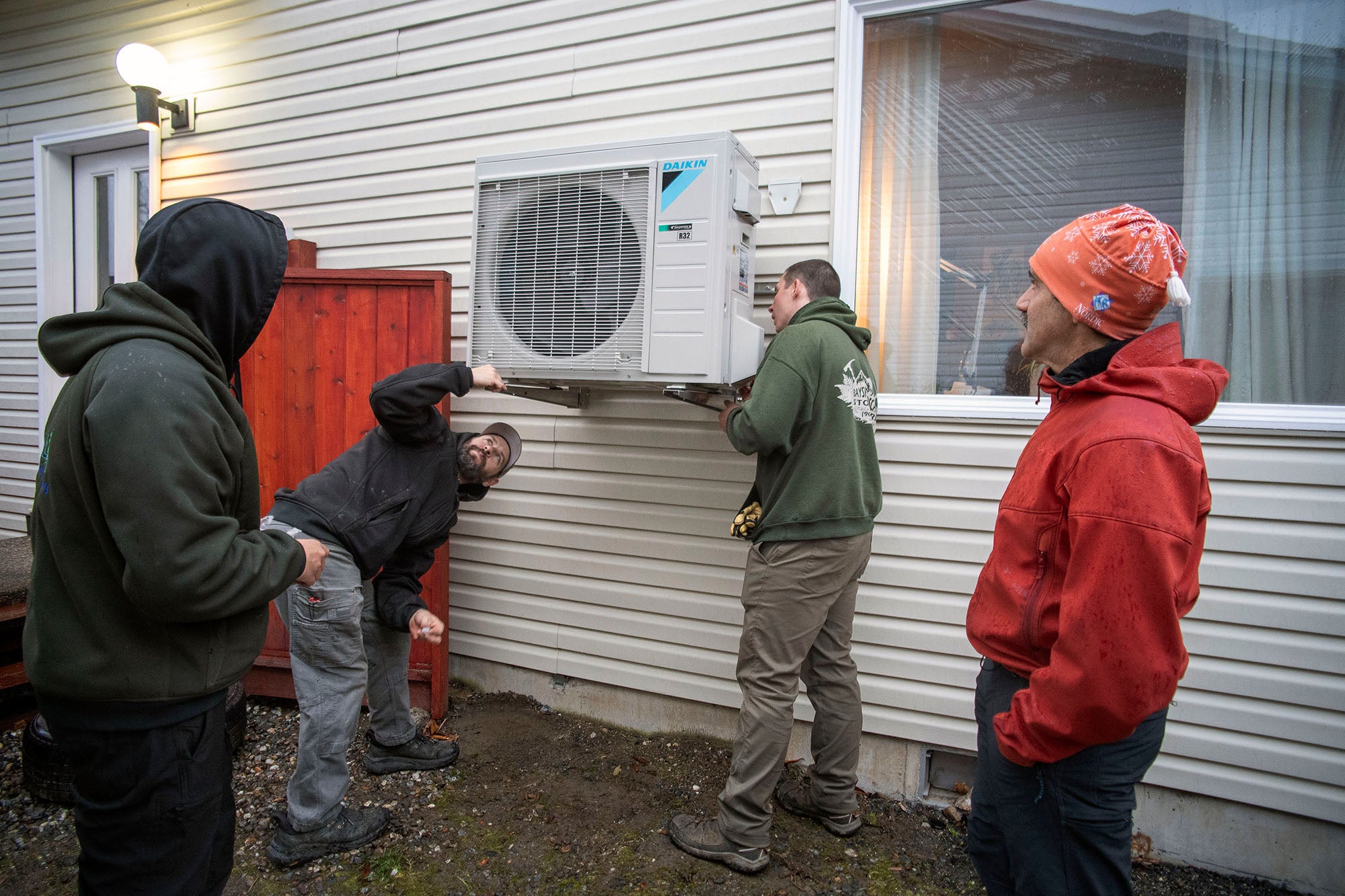
Cody Galletes, left, Sonny Ashby and Robby Brian, of Alaska Plumbing and Heating, install a heat pump onto its stand at a home as Andy Romanoff, executive director of Alaska Heat Smart, right, watches in Juneau, Alaska. (Michael Penn for Earthjustice)
The Dawn of a New Way to Warm and Cool Homes
Electric heat pumps, which can double as air conditioners when used in reverse, are many times more efficient than the most efficient oil, gas, or electric furnace. They work by transferring heat from the surrounding environment, rather than generating heat by burning climate-polluting fuel.
Heat pumps efficiently capture and extract heat from outdoor air and then amplify and transfer it to where it is needed inside a building. It’s similar to the technology we already use in refrigerators to keep our food cool. Around the country, Earthjustice is advocating for policies that make it easier for people to adopt heat pumps to help protect our climate and clean the air in our homes. In Washington State, for example, our attorneys defended new building codes incentivizing electric heat pumps over polluting methane gas in all new commercial and residential buildings.
While the mechanics of heat pumps might sound complicated, it’s quite simple. The technology is not new either, dating back to the 1930s when it was first pioneered. Recent improvements in heat pump performance, however, have helped accelerate the installation rate of heat pumps, especially in states with colder climates.
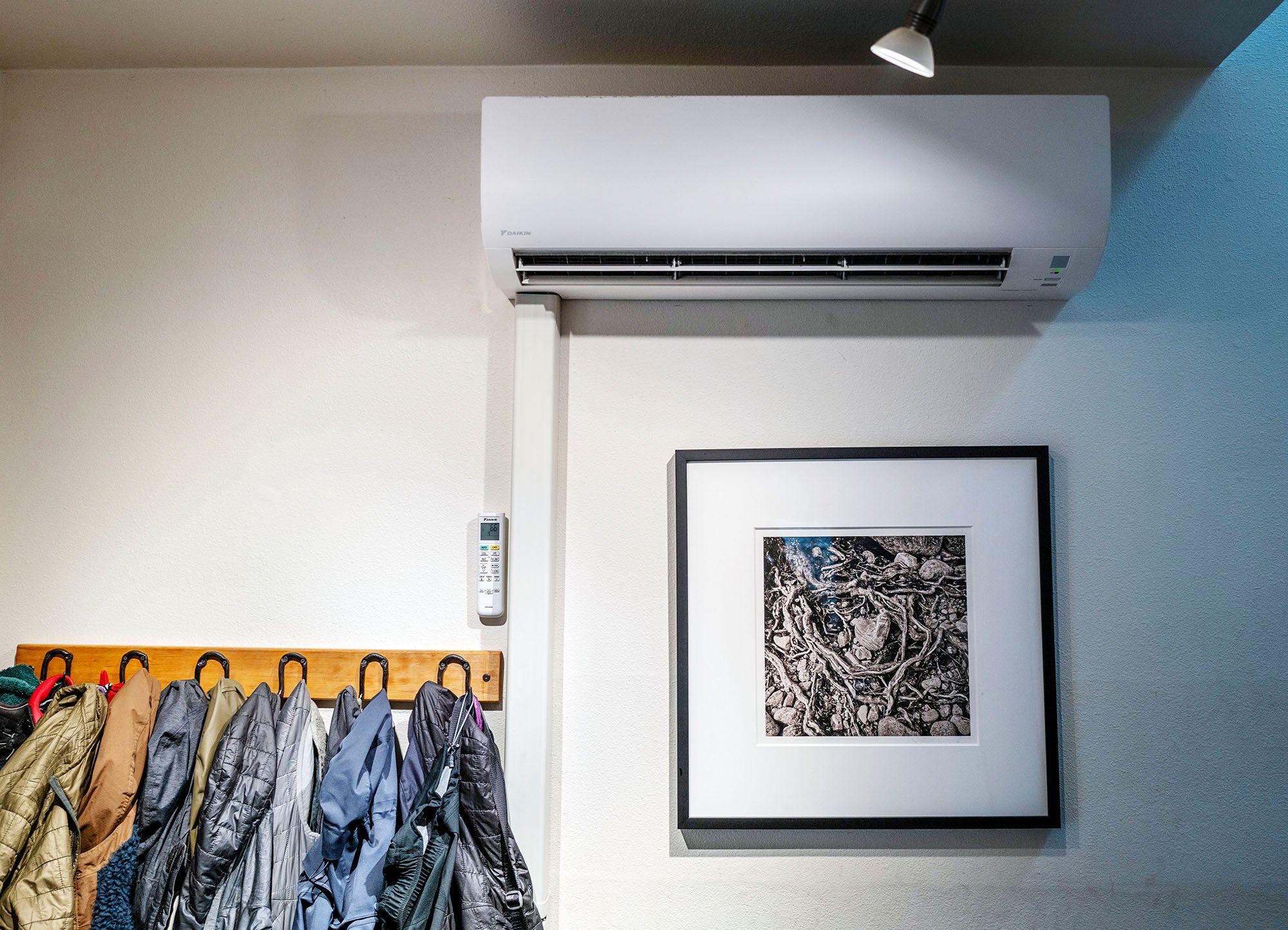
An inside wall unit to a heat pump system in Juneau, Alaska. (Michael Penn for Earthjustice)
“Our home heat pump keeps my family toasty all winter. It operates efficiently and saves us money over oil, even when temperatures drop,” says Olivia Glasscock, an Earthjustice attorney who lives in Juneau. “And from a climate and health perspective, it’s nice to know we’re not burning oil or gas in our home.”
According to an analysis by the U.S. Energy Information Administration, 13% of all U.S. homes used heat pumps for heating in 2020. The highest adoption rates of heat pumps are predictably in states with warmer climates like the Carolinas, Alabama, Tennessee, and Florida, but that’s changing. Heat pumps are quickly gaining in popularity in cold-climate states.
Like Juneau, the state of Maine has earned a reputation as a cold climate heat pump hot spot, with one in five new homes now warmed and cooled by heat pumps. Juneau ranks similarly, roughly on par with the national average, with heat pumps being installed at a fast clip in both existing homes and most new constructions.
Heat Pump Fever Above the 48th Parallel
In Juneau, the heat pump transition took off in 2016 after key factors came together to accelerate the community’s building electrification movement.
First came critical local climate policies. In 2011, the City and Borough of Juneau adopted the Juneau Climate Action and Implementation Plan, calling for a 25% reduction in greenhouse gas emissions by 2032. In 2018, the City Assembly upped that by adopting the Juneau Renewable Energy Strategy that set a target to obtain 80% of Juneau’s energy from renewable sources by 2045.
“With these city climate and energy policies in place, things started to move,” Romanoff says. “Nonprofit education efforts, changes in electrification technology, and creation of programs to assist homeowners in transitioning their heating and transportation — all of these ingredients crafted a recipe for action.”
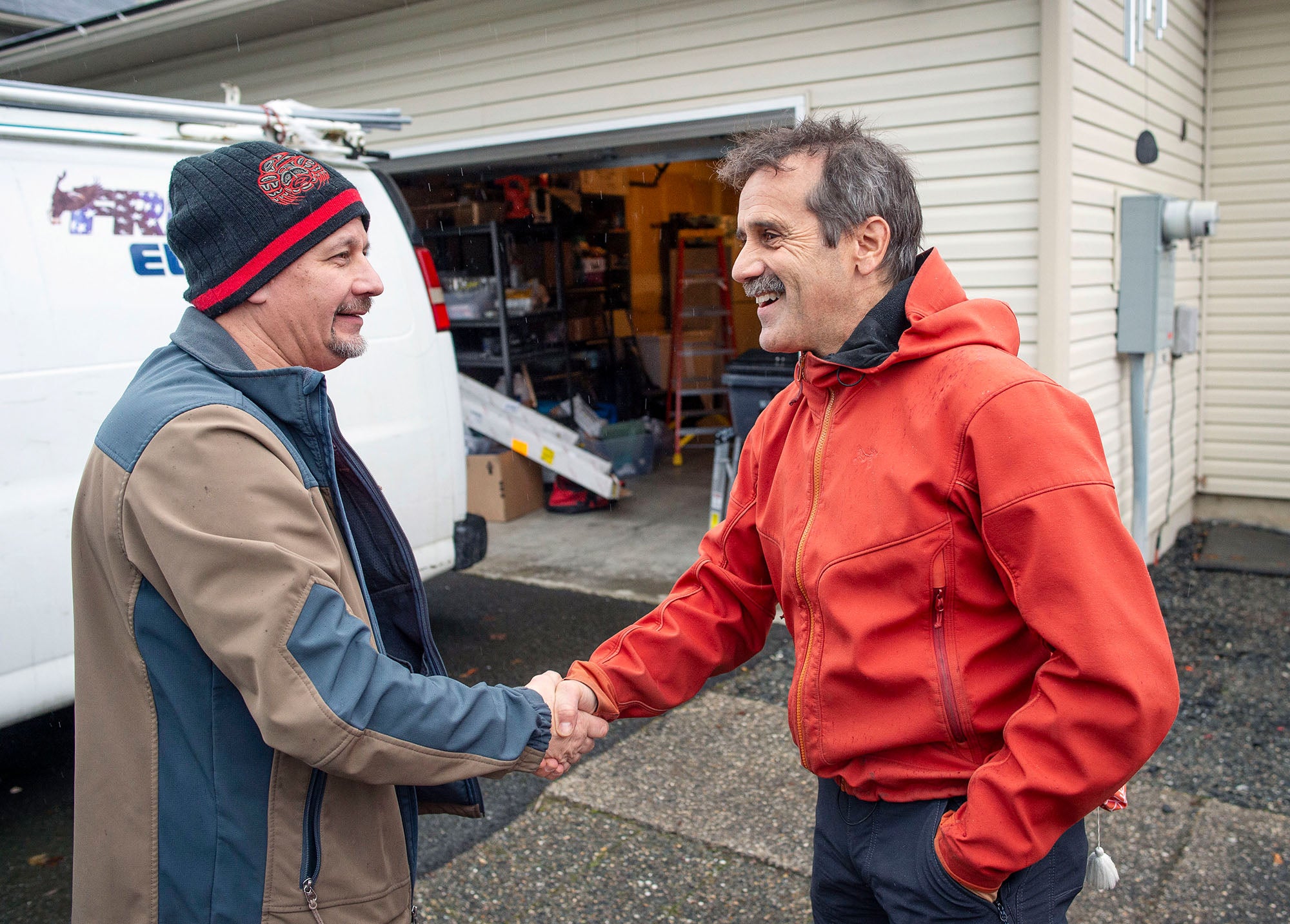
Andy Romanoff, Executive Director of Alaska Heat Smart, right, is greeted by home owner Jeff Hulse in Juneau, Alaska, during a heat pump installation (Michael Penn for Earthjustice)
Juneau had a head start in transitioning to a clean energy economy due to the town’s hydropower, developed in the 1890s for the gold mining industry in the region, which needed low-cost energy to extract gold and power. “Juneau has been able to build on that foundation for 130 years, and now with improvements in heat pump technology, we’re able to put that clean energy to much greater use,” Romanoff says.
Having heat pumps and clean hydropower available, however, wasn’t enough to encourage a sudden mass movement away from fossil fuels. Romanoff and others in Juneau, including members of the City and Borough of Juneau Assembly, recognized homeowners needed help to understand the benefits of heat pumps, learn what their unique homes required, and how to find financial assistance often needed to offset high upfront costs.
To help provide these services, Alaska Heat Smart (AHS) was founded in late 2019 with support from the City and Borough of Juneau, the Juneau Economic Development Council, Renewable Juneau, the Rocky Mountain Institute, the Environmental and Energy Study Institute, and Alaska Electric Light and Power.
Four years later, AHS has assisted over 1,000 households and offers a wide array of assistance programs to help homeowners lower their heating bills using clean energy. Staff answer questions about switching to heat pumps from electric baseboard heating or oil-burning systems via home heat pump assessments. Financial incentive programs supported by the Department of Housing and Urban Development and the Department of Energy help to offset the costs of installing a heat pump or making other energy efficiency improvements.
Clean Energy and Healthy Homes for All
To saturate the market, AHS offers programs for every economic level. Their Clean Heat Incentive Program (CHIP), supported by Alaska’s Senator Lisa Murkowski, provides incentives of between $1,500 to $3,000 to Juneau’s low- to middle-income homeowners. For low-income households, a Healthy Homes program can replace oil or inefficient electric heating systems with heat pumps, improve a home’s electrical systems, and offer weatherization improvements. The Juneau Carbon Offset Fund, soon to be under AHS management as the Carbon Reduction Fund, fully funds the transition from fossil fuels to clean heat pumps for lower-income households across southeast Alaska.
“We’re trying to reach everyone,” Romanoff says, “and we’re making coastal Alaska’s clean energy benefits possible for those who don’t have up front resources to make it happen on their own.”
Tlingit Haida Regional Housing Authority (THRHA) is another organization that helps Tribal citizens and other Southeast Alaska homeowners install heat pumps with the help of grant funding.
Lorraine DeAsis, THRHA’s director of project development, says people were skeptical at first. They wondered whether heat pump air flow would be sufficient to heat their entire home, if mold would grow, how much money they would save money, and more. She finally put one in her own home to prove they worked. With each unit she installed, doubt faded and enthusiasm grew.
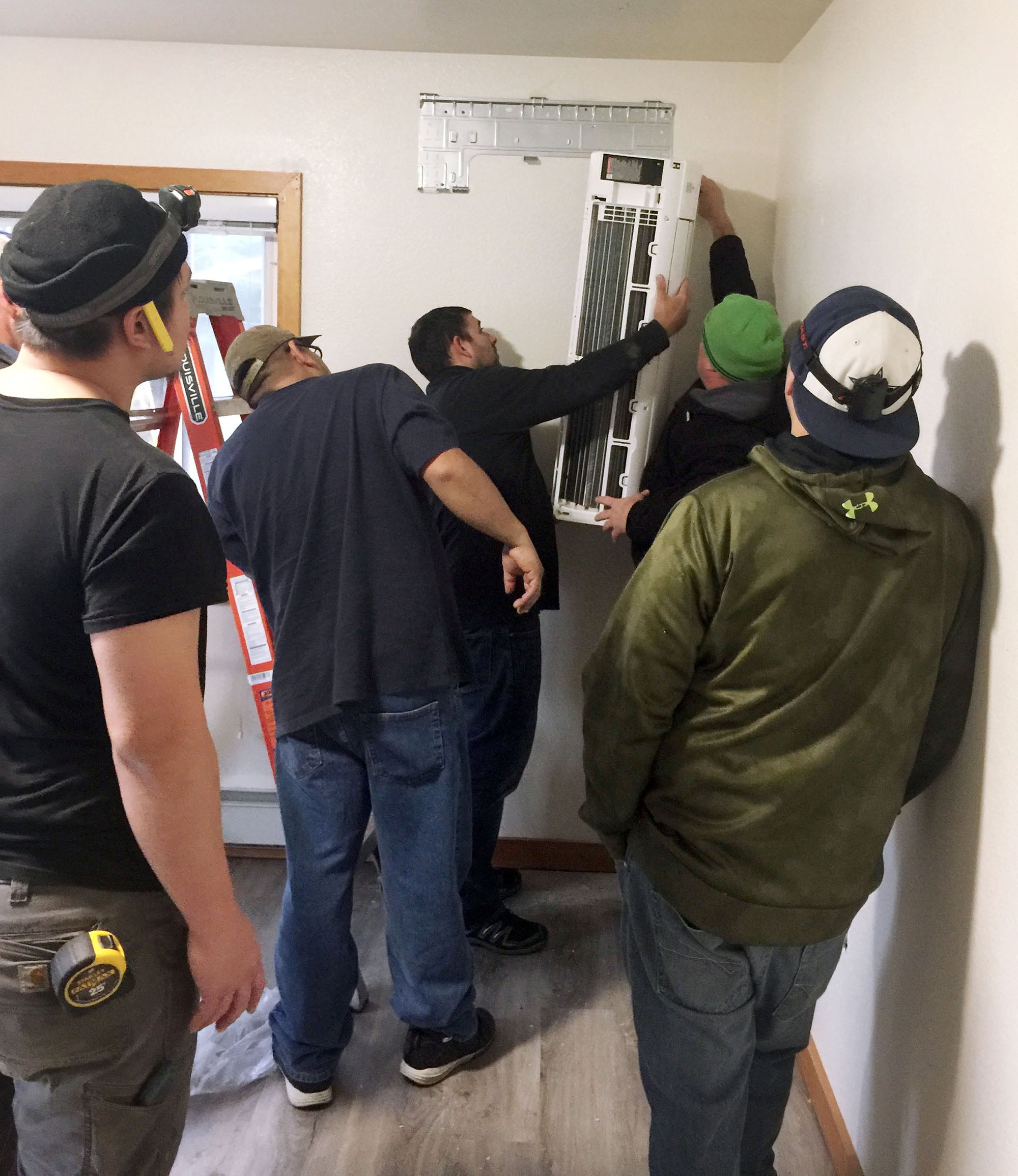
People learn about heat pump installation at a Tlingit Haida Regional Housing Authority location. (Photo Courtesy of Tlingit Haida Regional Housing Authority)
DeAsis helped one homeowner in a remote community who was afraid his electric bills would be high if he switched to a heat pump. He ended up saving so much money he put up Christmas lights — something he’d long wanted to do but didn’t think he could afford.
“Slowly but surely, the word got out,” DeAsis says. “People are very happy with heat pumps and they’re saving a lot of money. Now there’s a huge demand, especially as oil rates have gone up.”
Both DeAsis and Romanoff say that what’s happening in Juneau has been drawing the attention of other Alaska communities, including those with even colder climates. The Department of Energy recently granted AHS $4 million to expand its programs statewide and to remediate 25 Alaska nonprofit buildings to reduce heating costs.
“This is an exciting time to work in the energy space,” Romanoff says. “Support for lowering heating bills and reducing emissions is available for nearly everyone through tax credits, incentives, assistance programs, or rebates. Whether you live in Juneau, Bethel, Homer, or Ketchikan, lowering home heating costs has never been more possible and affordable.”
Earthjustice’s Clean Energy Program uses the power of the law and the strength of partnership to accelerate the transition to 100% clean energy.